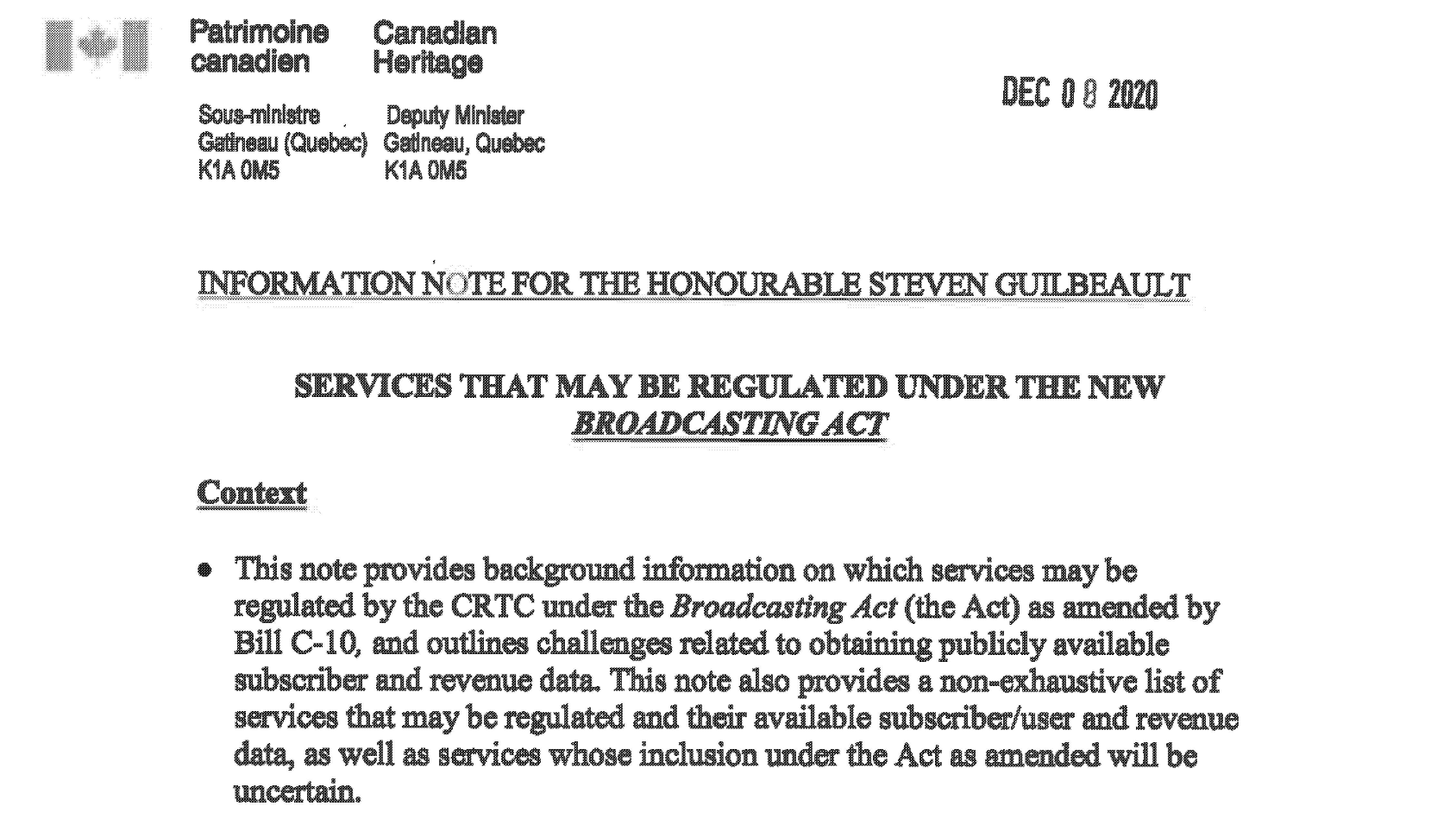This past week Bill C-10, Internet free speech, and the government’s digital policy agenda went mainstream as a lead topic in government, the media, and among many Canadians. This week’s Law Bytes podcast departs from the standard format as I explain why the bill has suddenly become a hot topic, how the government has been inconsistent and at times incoherent in its attempts to justify the bill, and why the concerns regarding freedom of speech and CRTC over-regulation are absolutely justified.

Canadian Heritage Memorandum, December 8, 2020, ATIP A-2020-00498
Bill C-10
Why the Guilbeault Amendment to Bill C-10 Makes CRTC Regulation of User Generated Content “Crystal Clear”
For the past week, Canadian Heritage Minister Steven Guilbeault has promised to address widespread concern over Bill C-10, the Broadcasting Act reform bill. After the issue emerged as an increasingly prominent part of House of Commons debate, Guilbeault stated;
we also want to make sure that the content that people upload on social media won’t be considered as programming under the act and that it won’t be regulated by the CRTC. And that’s why we will be bringing forward another amendment that will make this crystal clear.
That statement was repeated on Wednesday by Prime Minister Justin Trudeau in the House of Commons:
We have clearly indicated that this is not about individual users or about what Canadians themselves publish online. As the Minister of Canadian Heritage said, we will propose an amendment to make this crystal clear to us and to everyone else.
Regulating What Canadians See Online: Why Bill C-10 Would Establish CRTC-Approved TikTok, Youtube and Instagram Feeds
The uproar over Bill C-10 has rightly focused on the government’s decision to remove safeguards for user generated content from the bill. Despite insistence from Canadian Heritage Minister Steven Guilbeault that users will not be regulated and Prime Minister Justin Trudeau that users will not be required to make Cancon contributions, the reality is that the removal of Section 4.1 from the bill means that all user generated content is treated as a “program” under the Act and therefore subject to regulation by the CRTC.
That regulation is extensive and can include “discoverability” requirements that would allow the regulator to mandate that platforms prioritize some users’ content over others. Section 9.1(1)(b) of the bill states:
The Commission may, in furtherance of its objects, make orders imposing conditions on the carrying on of broadcasting undertakings that the Commission considers appropriate for the implementation of the broadcasting policy set out in subsection 3(1), including conditions respecting
(b) the presentation of programs for selection by the public, including the discoverability of Canadian programs;
Since the government is now treating user generated content as a program under the Act, this effectively reads that the CRTC can establish conditions respecting the presentation of user generated content for selection by the public, including the discoverability of user generated content.
Speaking Out on Bill C-10 and the Regulation of User Generated Content
The past week has seen a groundswell of public concern over Bill C-10 and the government’s plan to regulate user generated content. I have given numerous interviews, many of which do a nice job of distilling the key issues in an accessible manner. These include:
Free Speech Under Threat: The Real Consequences of Steven Guilbeault’s Battle with the Web Giants
My new Macleans op-ed notes that government legislation tends to attract a wide range of responses. Some bills grab the spotlight and become sources of heated debate for months, while others fly under the radar screen with few Canadians taking notice. Until recently, Bill C-10, the government’s Broadcasting Act reform bill, fell into the latter category. Introduced last November as part of Canadian Heritage Minister Steven Guilbeault’s mission to “make web giants pay”, the bill was steadily and stealthily working its way through the Parliamentary process with only a few days of “clause by clause” review left before a final reading and vote in the House of Commons.
Yet last week, the bill was thrust onto the front page of newspapers across the country with the public seizing on an unexpected change that opened the door to government regulation of the Internet content posted by millions of Canadians. The change involved the removal of a clause that exempted from regulation user generated content on social media services such as TikTok, Youtube, and Facebook. The government had maintained that it had no interest in regulating user generated content, but the policy reversal meant that millions of video, podcasts, and the other audiovisual content on those popular services would be treated as “programs” under Canadian law and subject to some of the same rules as those previously reserved for programming on conventional broadcast services.











